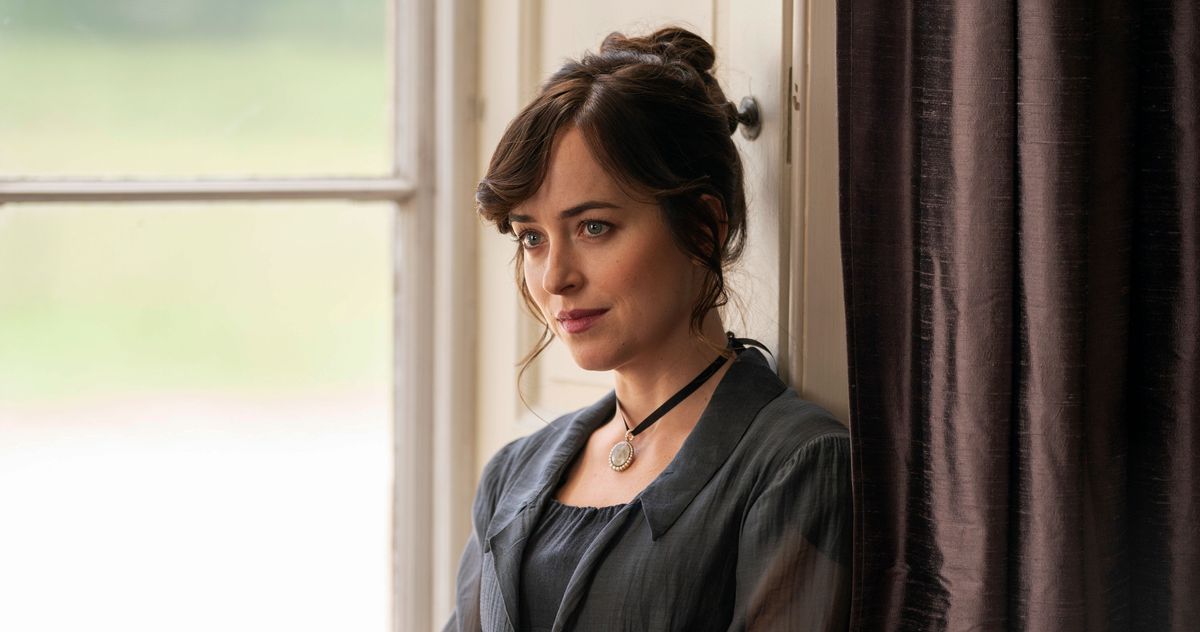
Is Jane Austen Just a Vibe Now?
Alison Willmore is a film critic for New York Magazine and Vulture. Formerly, she was the only critic at BuzzFeed News, the first TV editor at IndieWire, and the host of Filmspotting: SVU.
The new Persuasion throws out almost everything essential about its source material but keeps the country walks and the costuming. Photo: Nick Wall/Netflix
Best I can tell, the last big moment for straightforward Jane Austen adaptations was 2007, when ITV broadcast a trio of new made-for-television adaptations alongside the Kate Beckinsale Emma, the British network’s then-decade-old version that had the misfortune of having first been released a few months after the glitzier Gwyneth Paltrow one. These 2007 adaptations were meant to feel young and fresh with stars such as Billie Piper and a still relatively unknown Felicity Jones, and they included some touches that riled the traditionalists. The Guardian joked about how the low necklines in Mansfield Park had “the effect of a bunch of Bratz dolls in empire lines,” while Jane-ites were scandalized by the spectacle of Sally Hawkins running rom-com style through the streets of Bath at the climax of Persuasion. Still, they were films that aimed to more or less convey a version of what was on the page as it looked in the period in which the books were set.
Hardly a bold approach, but it’s one that the following 15 years have made seem downright exotic. The Jane Austen industrial complex has developed an overwhelming preference for modernization — either by setting the stories in the present day or by giving contemporary twists (like, say, zombies) to the old texts. Earlier this summer, there was Joel Kim Booster’s Fire Island, which used the framework of Pride and Prejudice for a gay vacation-set romantic comedy with mixed but interesting results. Pride and Prejudice remains the favorite to bring to the screen. Tracy McMillan wrote an adaptation for Lifetime that was set in Atlanta and had an all-Black cast, Keri Russell had an Elizabeth Bennet–esque romance at a Regency theme park in Austenland, and Hallmark’s Unleashing Mr. Darcy transported the story to the world of dog shows. Elsewhere, Sense and Sensibility has been transported to spas (Scents and Sensibility) and a Mexican American community in East L.A. (From Prada to Nada); Emma, to upper-crust Delhi (Aisha). And for the blunt, there’s A Modern Pride and Prejudice and Modern Persuasion.
Anyone who grew up loving Clueless can understand the allure of pulling Austen into the present day, even if her satirical edge tends to get lost in translation, leaving behind just the misunderstandings of intent and the eventual making up of a conventional courtship comedy. But I can’t help but feel that the inevitable end point of all this quippy recontextualizing is something like the new take on Persuasion that debuts on Netflix this month, starring Dakota Johnson as an Anne Elliot who exchanges sly looks with the audience and has with more in common with a pratful-prone rom-com heroine from the aughts than the Austen character. Persuasion isn’t a modern-day adaptation, but the characters occasionally let loose with lines like “It is often said that if you’re a five in London, you’re a ten in Bath.” If the film, which comes from theater director Carrie Cracknell and screenwriters Ron Bass (My Best Friend’s Wedding) and Alice Victoria Winslow, were committed to contrasting its historical setting with anachronistic slang, that would at least have been a choice. Instead it dips in and out, its dialogue reading like a clumsily simplified version of a classic for younger readers.
In the book, when Anne reunites with her former fiancé, Captain Frederick Wentworth (Cosmo Jarvis), the man she was pressured by her family to give up seven years ago but still loves, Austen writes, “Now they were as strangers; nay, worse than strangers, for they could never become acquainted.” In the movie, Johnson turns to the camera and says “Now we’re worse than exes — we’re friends.” In the book, the rise of Frederick’s fortunes coincides with the fall of the Elliots, giving a bitter irony to the reasoning behind Anne’s opting to break her lover’s heart. In the movie, family friend Lady Russell (Nikki Amuka-Bird) flatly informs Anne that “marriage is transactional for women.” Persuasion is about a woman who did something she deeply regrets and feels her life passing by when, at 27 and verging on spinsterhood (her “bloom” is judged by her vain father to have “vanished early”), she finds that, against all hope, she has another chance at the love she lost. But onscreen, those seven years are presented as a jokey lull, with Johnson — who’s never anything other than radiant — declaring she’s “single and thriving” over a shot of her character drinking wine and crying in the bath.
Austen isn’t sacred. There’s no inherent virtue in being as faithful to her books as possible, and trying to do that still requires a degree of guesswork about artistic intent as well as leaving things out for the sake of running time. But Persuasion so lacks interest in the spirit of its source material that you’re left wondering why it bothers with it at all. Austen is reduced to just a vibe — to bonnets, walks in the countryside, sessions of piano playing in the parlor, a vague sense of a stuffy British accent. It’s not the desire to sex things up that’s frustrating (what is Bridgerton if not those same Austen vibes combined with lustily unapologetic fucking?). What irks is the removal of the urgency underneath all these mannered traditions and maneuvers involving social standing, the desperate need to fall in (of course) sincere love with someone who coincidentally possesses the fortune necessary to support one’s family. Persuasion turns it all into cosplay centered on a plucky protagonist who seems as though she’d bounce back if things didn’t work out with Frederick, maybe after a yoga retreat in Turks and Caicos to find herself and have a vacation fling.
It’s not hard to guess why there have been so many more modern Austen takes lately. Costume dramas are often more expensive to make, and for a long time they were considered closed off from any actors who weren’t white, the past treated as a hermetically sealed space. But the long-coming embrace of color-blind casting and, even better, color-conscious casting in these productions has exposed just how pointless as well as exclusionary those old assumptions were. Mr. Malcolm’s List, a recent frothy charmer from director Emma Holly Jones, stars Freida Pinto, Sope Dirisu, and Zawe Ashton and manages to be more Austen-like in its sensibilities than Persuasion by appreciating that the emotional restraint of its characters doesn’t make them unengaging. Meanwhile, Autumn de Wilde’s clever Emma. gave a wash of Instagram aesthetics to what was otherwise a fairly straight retelling of the book. Like any author whose work remains popular, Austen’s writing is destined to get reinterpreted and reconsidered with the times. It’s when she’s reduced to just dances and empire-waist gowns that she’s least interesting.
The Critics Newsletter
Sign up to get New York’s week in reviews.This site is protected by reCAPTCHA and the Google Privacy Policy and Terms of Service apply. Vox Media, LLC Terms and Privacy Notice
<
p aria-hidden=”true”>By submitting your email, you agree to our Terms and Privacy Notice and to receive email correspondence from us.










































![iFi's GO Bar Kensei Dongle DAC Supports K2HD Technology With Some Samurai Swagger [Updated] iFi's GO Bar Kensei Dongle DAC Supports K2HD Technology With Some Samurai Swagger [Updated]](https://i0.wp.com/cdn.ecoustics.com/db0/wblob/17BA35E873D594/33FF/45A11/QTXOLJR4xDKSNMMk2WlTgjaIlvSgcYpeU1xJzUwIoYs/ifi-go-bar-kensei.jpg?w=768&ssl=1)































